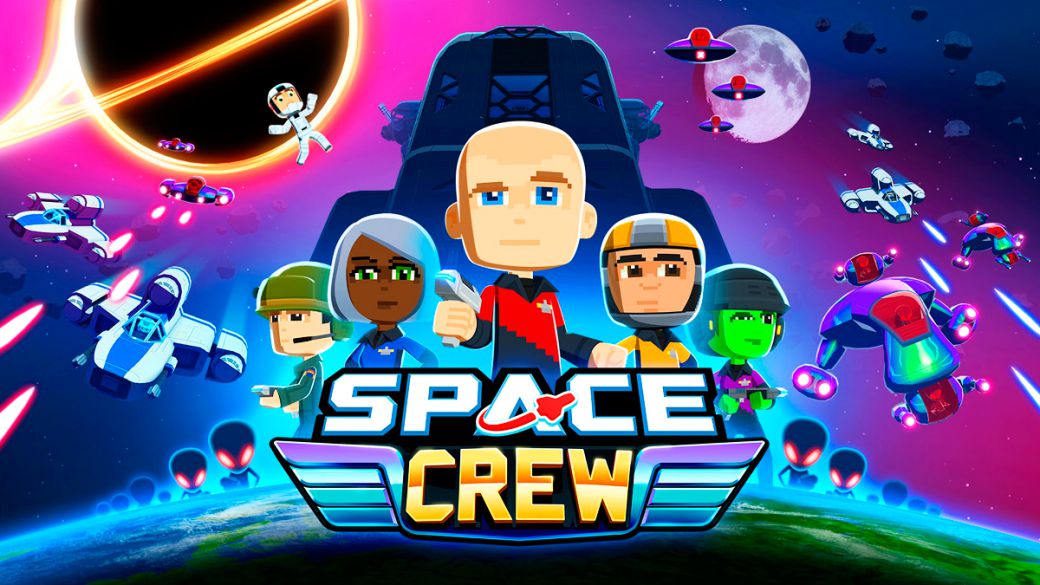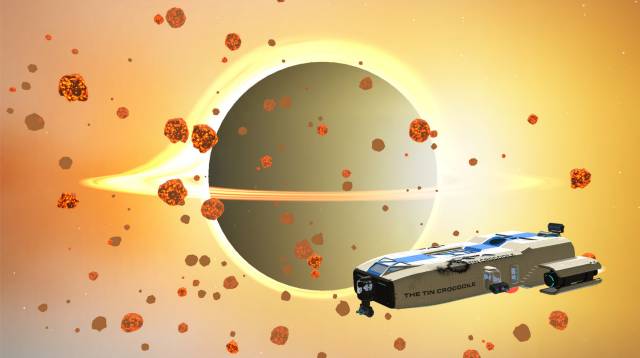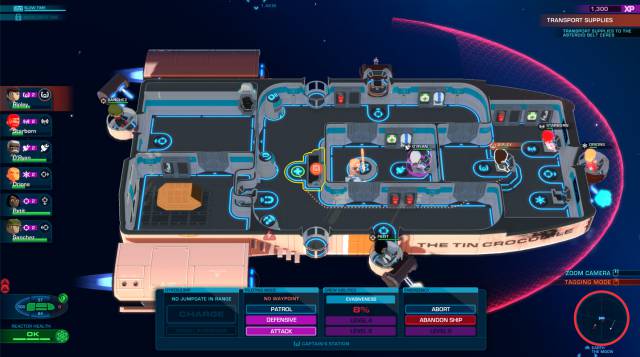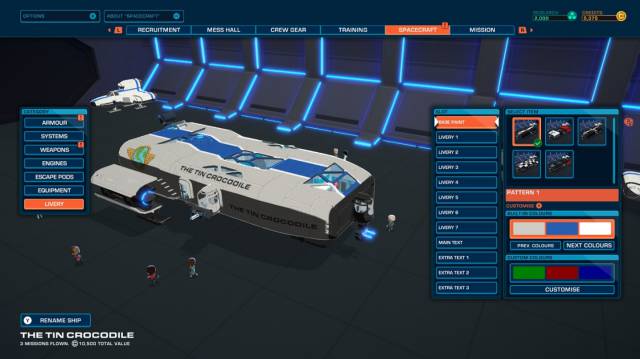
The creators of Bomber Crew release a new real-time strategy (RTS) game with good ideas and nods to Star Trek, but they are far from finished.
After the success of Bomber Crew, its first game, Jon Wingrove and Dave Miller have once again joined forces in a very similar project, as they already suggest from the name. We refer to Space Crew, the second release by Runner Duck, the tiny indie studio that both friends make up in its entirety (Wingrove in charge of programming and Miller as responsible for the design and artistic section). A new real-time strategy (RTS) game that puts aside the warlike atmosphere of the previous one to embrace the mysteries of space and follow in the footsteps of Star Trek.
Welcome to Starfleet
The space opera of Runner Duck and Curve Digital, its distributor, does not begin in Deep Space 9, but in Athena, a space base that serves as a menu (HUB) and allows us to create and edit our own crew. For that reason not yet managing the Enterprise, we will soon be surrounded by Kirk, Spock and company. And having permadeath in the game, sooner rather than later these will give way to their children, grandchildren and great-grandchildren, such as the esteemed McCoy third and Uhura 4 of our game. But if there is something that resembles the heroes of Space Crew with those of Gene Roddenberry, it is not so much the editor as his potential specialization in different classes and trades. We will sail seas of stars with a maximum of six crew members, among which there must always be a captain (establishes the main objective of the mission and orders the jumps to hyperspace), an engineer (fixes the damage of the ship and takes care of the reactor), a security officer (able to open and close the floodgates depending on the risk), a telecommunications officer (who tracks the target, makes contact and marks the way forward), as well as a couple of weapons officers (at to put in charge of turrets and defense systems). A very complete cast of roles and full of details that bring the experience closer to simulation rather than to the arcade genre.

Once our team is formed, it is the turn to accept some missions and go out to sail the universe. Space Crew lacks history, although not context. We are in a distant future in which humanity fights against the Phasmids, an alien race that tries to conquer us. That is why all missions have to do with these. Defeat an entire fleet of enemy ships, deliver packages in their territory, come to the rescue of scientists who are being attacked by aliens, and so on. Upon finishing and returning to base, Athena, we will receive experience points for each member of the crew, research points and money. The experience allows you to level up McCoy third and Uhura 4, with which we unlock new skills and strategic options. Weapons officers will sharpen their marksmanship; the captain will remember that he can order evasive maneuvers; the engineer will be able to extract the energy from the reactor to use it in the shields; and so on. Over time we will even discover how to go in stealth mode and how to launch electromagnetic bombs that paralyze all the adversaries around. For their part, the research points are like investing in R&D. Thanks to them we will unlock plans to make new parts of the ship, or special costumes and objects for these friendly galactic hitchhikers. And money … well, it’s money. Without him it happens as in real life. The wonders of the research team stay in the minds of their scientists.

Captain, everything is in your hands
When it comes to getting at the controls, Space Crew is faithful to the RTS genre (to which it also belongs, for example, the XCOM saga) and bases all its gameplay on menus, menus and more menus. You click on top of a character and then click on one of the drop-downs that appear to give it an order, or click on a point of the ship so that said character moves there or interacts with the object that you send him. We do not move the crew directly, nor do we take sides in the space firefights they wage against the Phasmids. For this reason, it goes without saying that the best version of the game is the PC version, since the keyboard and mouse control is the fastest and most intuitive. Despite this, its creators have made an effort not to punish the console user too much and we have several options to slow down time. They serve to compensate for those extra seconds that it takes us to do everything. They do not eradicate the problem, but at least they hide it. In any case, and returning to the playable theme, we have to constantly be giving orders and making decisions.
We can, for example, deactivate the gravity systems of the ship and use the energy they consume to boost the shields. But of course, in return the characters will take longer to move through it due to zero gravity. We can start making evasion maneuvers, but at the cost of our gunners getting dizzy and misfiring more than a fairground shotgun. And we can also ask our engineer to put on a jumpsuit and go into space to fix the hull of the ship, but being much more exposed and with the risk that if it falls, goodbye to the rest of the repairs. You often have to choose between healing with the medicine cabinets, which can be carried around, or in the medical center. Perhaps the first aid kits seem more comfortable to us, but put that these are finished, an enemy ship approaches us and the aliens take the section where the medical center is. Let’s see how we recover from then on. Who will be exposed in the turrets? Which position is more expendable in case of having to sacrifice someone? Do we put out the fire that has arisen or do we focus on repairing the radiation coming out of the reactor? Space Crew is a lot of fun at first, and during the opening bars it will delight science fiction fans. We really feel like being in command of a ship and we find dozens of problems and situations that are quite original. But that effect falls apart like a sugar as the hours go by.

Your universe is not infinite …
The big problem with Space Crew is that after three or four missions you will have already seen everything. The story is anecdotal, practically non-existent, and does not provide any incentive to repeat the same missions over and over again. Its variety is nil. There is some final boss and some hopeful threat, but nothing. It is always the same. You leave the base, jump into hyperspace, enter a sector full of phasmids, eliminate them, complete the objective by pressing a button, eliminate enemy reinforcements and return home. And again. And another, and another, and … It’s repetitive and tedious. Even more so if we take into account that the battles have an identical course and that they are located in just a couple of scenarios. One dark and empty and one with an asteroid belt. (And it goes without saying that they do not influence what is playable). Also, the more the same missions are repeated, the more you are able to detect the big problems in the game. Artificial intelligence, for example. Why are there no predefined orders? Why can’t I tell a colleague that if he is in low health, he will heal without my permission? Or attack the aliens when they pass by. Don’t ignore them like you’re blind. It is angry to always face the same situations and feel that the characters act as if it were the first time.

… but it has too many black holes
Apart from the AI we also have a complaint about the degree of depth. Where are the various types of ammo for the Bomber Crew? And that’s for saying something. There were many more things to be aware of in that one. We had to recharge, be aware of the weather, calculate the altitude (if you flew too high you would freeze and if you did it too low all the enemies would see you), and so on. This time everything ends up being simplified and reduced to putting the entire crew (whatever their position) at the controls of the turrets. If something breaks we entrust the engineer to fix it, and if you get boarded you tell the security officer to lock up the invaders in a section of the ship. Already. As the hours go by we will notice that there is not much more. We will spend long periods of time doing nothing, just staring at the crossfire and waiting for it to end. There are so many defensive skills that you don’t need to worry too much. It is difficult to have casualties (there is even an enhancer that makes us invulnerable for 40 seconds). The edition of the nave, to cite another example of the evident lack of depth, does not allow something as essential as moving the position of the turrets, or the distribution of the rooms. Not to mention that no moment grows in dimensions, nor does the number of members increase. There is no evolution.
But if something is especially problematic, it is certainly the difficulty curve. Space Crew is extremely tricky and only increases the degree of challenge by praising the fighting to exhaustion. Lower the aim of our gunners to a minimum, hide the enemy life bar and have us for hours crossing laser shots against enemies that seem as indestructible as we are. It doesn’t get complicated, it gets longer. To improve our ship we require exorbitant amounts of money and to get them we will have to repeat missions and grind to infinity and beyond. But even the simplest missions, the ones we take to train newbies or earn easy money, can take up to thirty or forty minutes. It is an unsustainable and boring progression. You spend too much time for what little the game gives you back. As in some of the final missions you get lost and even lose the crew, it’s time to go back to the starting square and pull your hair out. Some things are preserved despite permanent death, such as items and new ship parts, but it takes some training for the rookies to have access to them. After the twenty, twenty-five hours that the adventure lasts, we are left with the feeling that it has barely changed compared to the first mission and that in general it has taken a toll on our patience.

It’s a shame because the base was good and the idea and situations it offers are still original (although not as original as with Bomber Crew, because in space we already have alternatives like Space Heaven or Rimworld). We also understand that, with two people behind, much more development and depth we could not ask for, although we did not expect the options to be narrowed between the previous Runner Duck game and this one. Finally, make mention of its graphic and sound section, which although it has many must (especially in terms of variety and use of the setting), achieves a nice and fun set, with a meritorious translation into Spanish full of jokes. It is a pity that the camera clouds the experience a bit, since it frequently leaves us blind and plays more than a trick on us. But deep down, and remembering the beginning of The Foundation, by Isaac Asimov, those who are left wanting to admire the majesty of space and its shapes and colors should be told the same thing that they told Gaal Dornick upon his arrival in the big city, when they didn’t let him pass the viewpoint. “–Anyway, Trantor is nothing more than a gray spot, boy.”
* Reviews performed with a code provided for the Nintendo Switch version.
CONCLUSION
The first hours in Space Crew teleport us to the command deck of the Enterprise and put us giving orders as if we were Captain Kirk. A trip to childhood. The amount of options and details that there are, or the originality of the situations that arise, make the feeling that we are commanding a real spaceship very vivid. But as time goes by we begin to notice something strange. We begin to see the same elements over and over again. The missions become identical and their solutions, exactly the same. When we learn the instruction manual of the ship we will discover that it is not as extensive and deep as we thought. Many of the possibilities we saw in Bomber Crew, the previous Runner Duck game, are missing. Exploring the ends of the universe cannot be that repetitive and tedious. Nor can it be that, during combat with an extraterrestrial race, the captain simply looks and waits for several minutes for his crew to take aim. Variety and dynamism are lacking. Above is then when we notice the traps of the console with the difficulty and we see how the audiovisual section is losing its charm. Stop being funny and we wonder if it really takes advantage of a similar setting. But it is not a matter of the graphic section, but that the lights have gone out and everything around us has faded. We weren’t on the Enterprise, we were in your typical cadet school simulator. The one in which Kirk spends the first twenty minutes of the movie and to which we have spent twenty hours. The one in which nothing we do has a reward, consequences or legacy. We are not suspended, but we are bored.
THE BEST
- Its translation and audiovisual finish exude sympathy.
- The first few hours, when you really feel like Captain Kirk.
- Situations the sea of originals …
WORST
- … that are repeated over and over again until exhaustion. It ends up being repetitive and tedious.
- It has lost options and depth to the Bomber Crew.
- It has a tricky difficulty that stretches the gum too much and demands a great deal of patience.
- The need to grind.
Right
It’s not the latest or the most original, nor does it have the best execution, but it can be fun if you like the genre. Good, but room for improvement.
